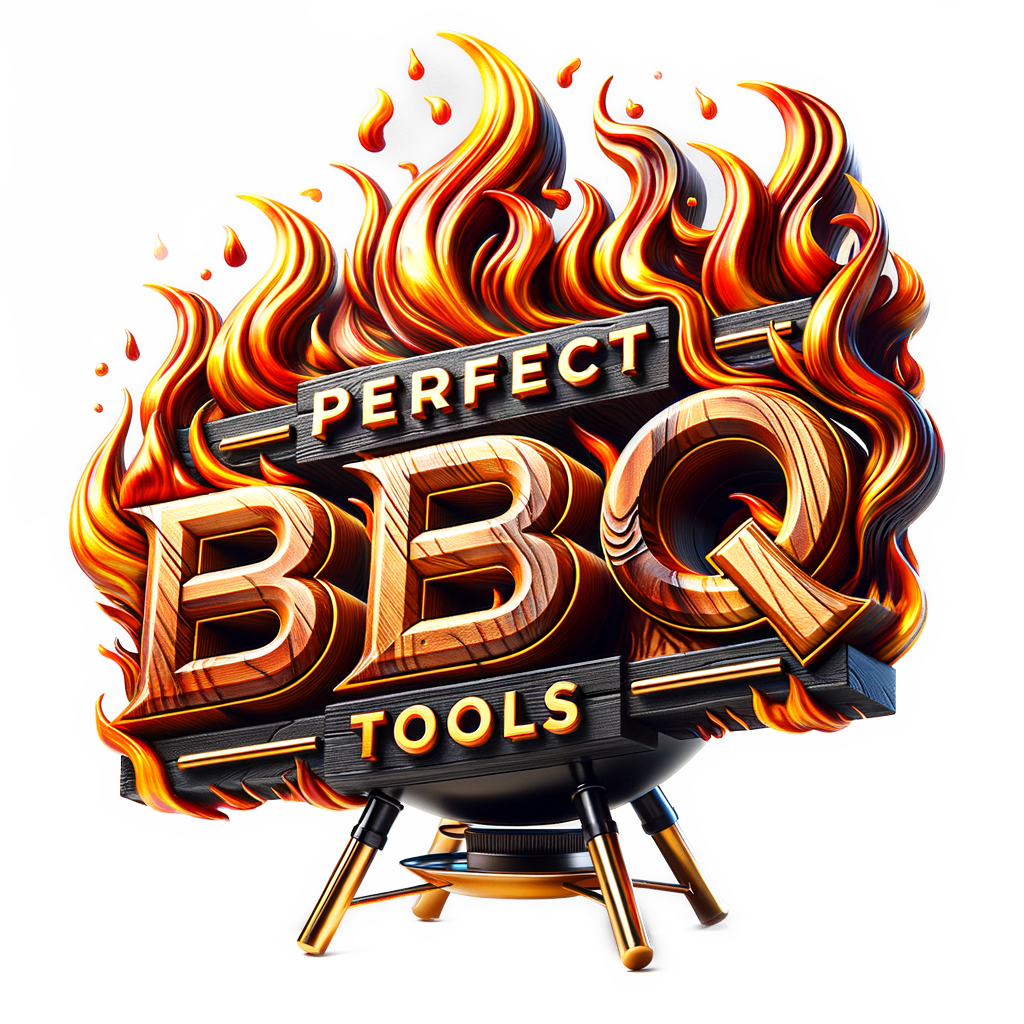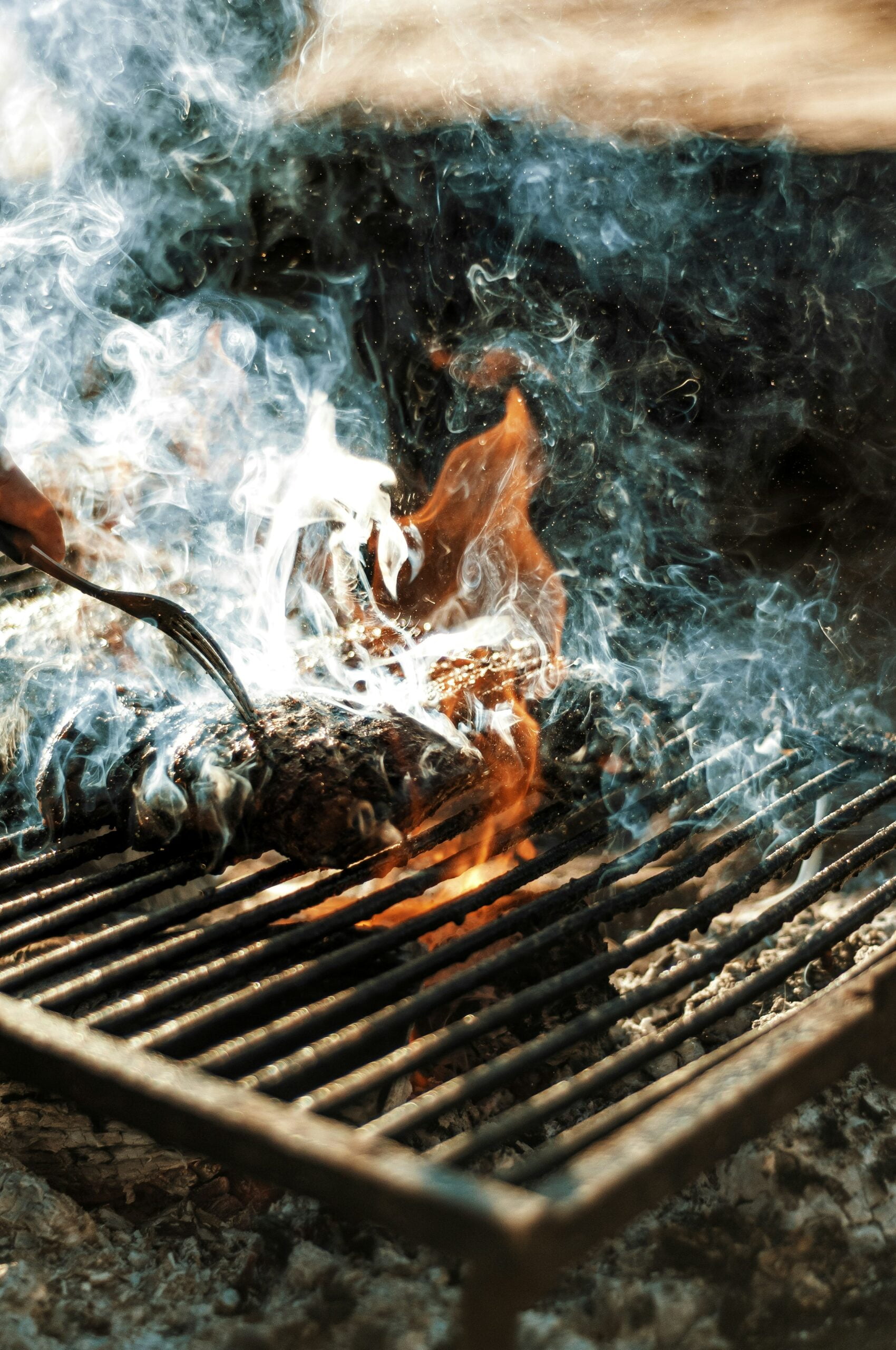Grilling food is not only a delicious way to cook, but it also brings people together for fun and relaxed gatherings. However, before you fire up that grill, it’s important to have the right tools to ensure a successful cooking experience. From tongs to spatulas, brushes to grill racks, this article will guide you through the essential tools you need to have on hand for your next grilling adventure. Get ready to elevate your barbecuing game and become the master of your backyard grill! Grilling food is a popular cooking method that many people enjoy, especially during the summer months. Whether you’re a grilling aficionado or just starting out, having the right tools is essential to ensure a successful grilling experience. In this article, we will explore the basic tools needed for grilling food and provide tips on choosing the right ones.
Grill
Grills come in various shapes, sizes, and fuel options. Choosing the right grill for your needs is an important decision. Here, we will compare two common types of grills: charcoal and gas.
Charcoal vs. Gas Grill
Both charcoal and gas grills have their advantages and it ultimately comes down to personal preference.
Charcoal grills provide a smoky flavor that is often sought after by grill enthusiasts. They are also typically more affordable and portable. However, charcoal grills require more time and effort to light and maintain the fire, which may not be suitable for those who prefer convenience.
Gas grills, on the other hand, offer quick and easy ignition with precise temperature control. They are also easier to clean and require less maintenance. However, gas grills often come at a higher price point and may lack the traditional smoky flavor associated with charcoal grilling.
Consider your cooking style, desired flavor, budget, and convenience when choosing between a charcoal and gas grill.
Indoor Grills
If grilling outdoors is not an option for you, or if you simply prefer the convenience of grilling indoors, an indoor grill is a great alternative. Indoor grills are designed to be used on a stovetop or countertop and are ideal for those who live in apartments or areas with limited outdoor space.
Indoor grills often come with adjustable temperature settings, allowing you to control the heat for optimal cooking. They also offer a smokeless cooking experience, making them suitable for indoor use. When choosing an indoor grill, consider the size, surface area, and heating capabilities to ensure it meets your grilling needs.
Grill Brush
A grill brush is an essential tool for keeping your grill clean and well-maintained. When it comes to grill brushes, you have the option of choosing between bristled and bristle-free brushes.
Bristled vs. Bristle-free
Bristled brushes are the most common type of grill brush and are typically made with stainless steel or brass bristles. They effectively scrape off residual food particles and grime from the grill grates. However, it is important to regularly inspect bristled brushes for loose or worn-out bristles, as they can potentially come loose and end up in your food.
Bristle-free brushes, on the other hand, are made with metal or nylon bristle alternatives. These brushes are a safer option and eliminate the risk of bristles getting stuck on the grates or ending up in your food. They are also easier to clean, as there are no bristles to worry about. Consider your personal preference and safety concerns when choosing between bristled and bristle-free brushes.
Long Handle Brushes
When selecting a grill brush, look for one with a long handle. A long handle allows you to clean the grill easily and safely, keeping your hands away from the heat. It also provides a comfortable grip, giving you more control when scrubbing the grates. Moreover, a long handle allows you to reach the back of the grill without straining or burning yourself.
Cleaning the Grill Brush
To prolong the life of your grill brush and ensure effective cleaning, it is important to clean the brush after each use. Rinse off any food particles or grease and use warm soapy water to sanitize the brush. Thoroughly rinse and air-dry the brush before storing it. Regularly inspect the brush for any signs of wear and tear and replace it as needed to maintain optimal cleaning performance.
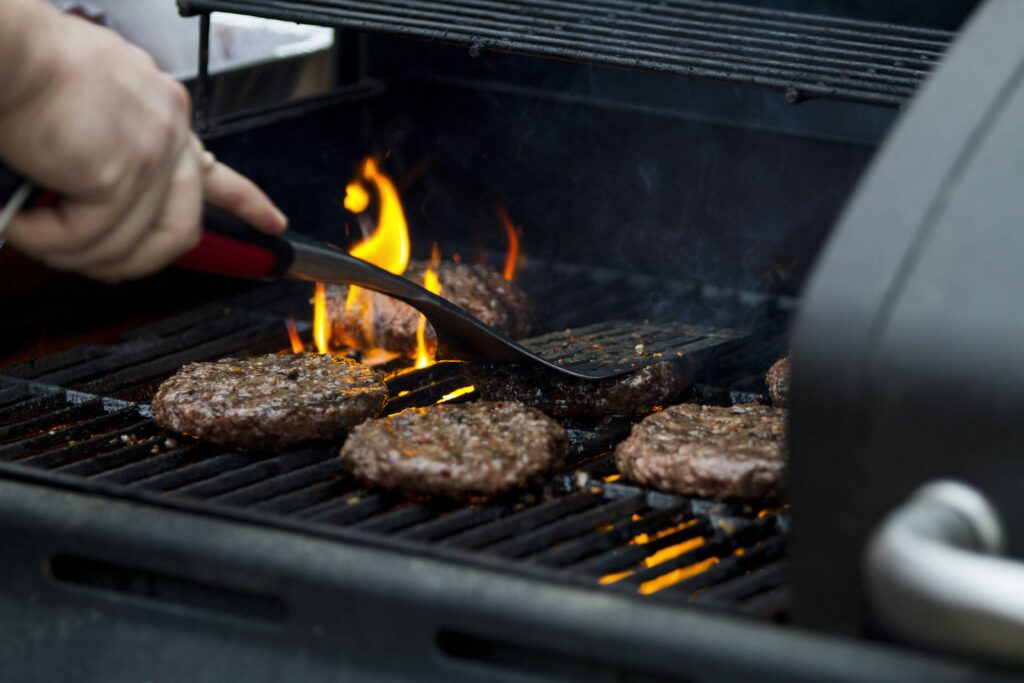
Tongs
Tongs are indispensable when it comes to grilling. They allow you to flip, turn, and move food on the grill with ease. Here are some factors to consider when choosing tongs for grilling:
Length of Tongs
When it comes to grill tongs, length matters. Longer tongs, usually around 16 to 18 inches, provide better reach and keep your hands at a safe distance from the heat of the grill. This is particularly important when grilling larger or thicker cuts of meat. Longer tongs also give you more control over delicate items such as vegetables or fish, preventing them from falling through the grates.
Grip and Material
Choose tongs with a comfortable grip that allows for easy handling, even with greasy or wet hands. Look for tongs with heat-resistant handles to prevent burns. Stainless steel tongs are a popular choice for grilling, as they are durable, easy to clean, and resistant to rust. Consider the quality of the material and the sturdiness of the tongs to ensure they can handle the weight of your grilling needs.
Locking Feature
Some tongs come with a locking feature that allows for easy storage. This feature can be handy when you want to keep your tongs secure and save space in your grilling tool collection. The locking mechanism helps keep the tongs closed, preventing them from accidentally opening and taking up unnecessary space in your kitchen or grill drawer.
Spatula
A spatula is another important tool for grilling, especially when it comes to flipping burgers, fish, or delicate items that require a gentle touch. Consider the following factors when choosing a spatula for grilling:
Size and Shape
The size and shape of the spatula are important considerations. Look for a spatula that is wide enough to easily flip burgers and fish without damaging or breaking them. A wider spatula also allows you to lift and transfer larger items, such as whole chickens or ribs, with ease.
The shape of the spatula’s head is also crucial. Opt for a spatula with a thin and flexible head to easily slide underneath food. This flexibility prevents food from sticking or breaking apart when flipping. Avoid spatulas with thick or rigid heads, as they can make flipping delicate items more challenging.
Material and Design
Choose a spatula made from sturdy and heat-resistant materials such as stainless steel or silicone. Stainless steel spatulas are durable, easy to clean, and resistant to rust. Silicone spatulas, on the other hand, are great for non-stick grilling surfaces as they prevent scratching.
Consider the design of the spatula as well. Look for a spatula with a comfortable handle that provides a secure grip. Some spatulas come with a built-in bottle opener or serrated edges, adding versatility to your grilling tool.
Flexibility
The flexibility of the spatula is essential for easy flipping. A flexible spatula allows you to glide underneath food, ensuring a smooth flip without damaging the texture or presentation. Test the flexibility of the spatula before purchasing to ensure it meets your grilling needs.
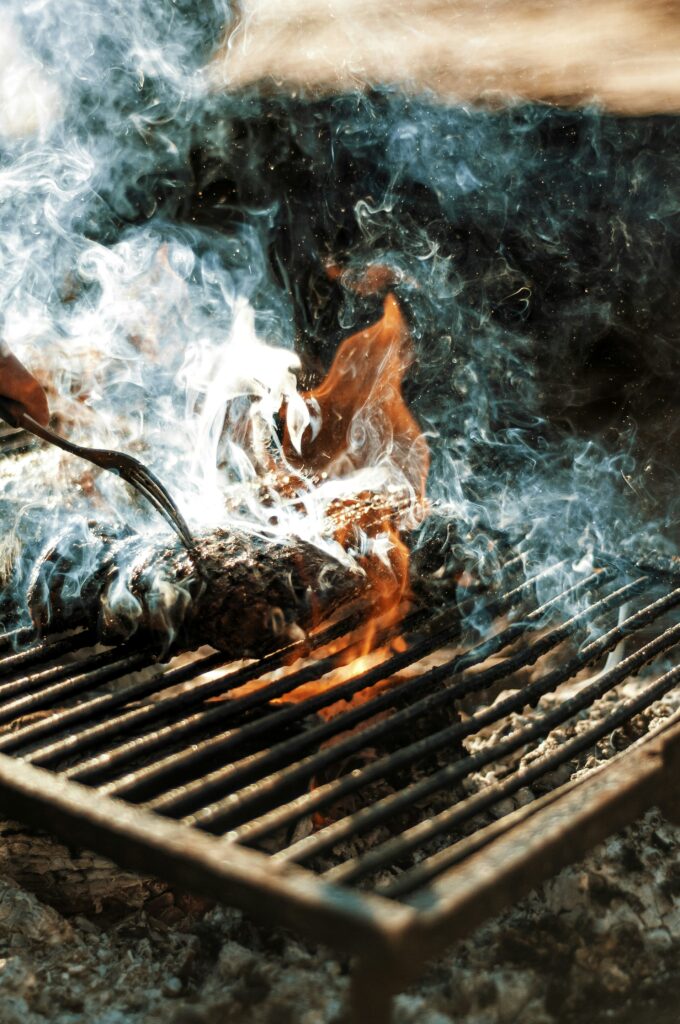
Grill Gloves
Grill gloves are a must-have accessory for grilling enthusiasts. These gloves offer protection from the heat and flames, allowing you to handle hot grills, pans, and food with confidence. Consider the following factors when choosing grill gloves:
Flame Resistant Materials
Look for grill gloves made from flame-resistant materials, such as aramid fibers or leather. These materials provide excellent heat resistance and protect your hands from burns. Flame-resistant gloves are designed to withstand high temperatures, making them ideal for grilling.
Sizes and Fit
Grill gloves come in various sizes, so it’s important to find a pair that fits snugly on your hands. A proper fit ensures better dexterity and control when handling hot objects. Measure your hand size before purchasing and refer to the manufacturer’s sizing guide to find the right fit.
Cuff Length for Arm Protection
Consider the length of the glove cuff for added arm protection. Longer cuffs provide coverage for your forearms, protecting them from accidental burns. This is particularly important when grilling larger cuts of meat or when reaching into the grill. Opt for gloves with extended cuffs to ensure maximum safety and protection.
Grill Thermometer
A grill thermometer is a crucial tool for achieving perfectly cooked meats and ensuring food safety. Here are some factors to consider when choosing a grill thermometer:
Instant Read vs. Leave-In
There are two main types of grill thermometers: instant-read thermometers and leave-in thermometers.
Instant-read thermometers provide quick and accurate temperature readings within seconds. They are ideal for checking the doneness of meats and verifying the internal temperature of grilled food.
Leave-in thermometers, on the other hand, are designed to remain in the food while it cooks. These thermometers have a probe that goes into the meat and a display that sits outside the grill. This allows you to monitor the temperature without lifting the grill lid, ensuring an even cooking process.
Digital vs. Dial
When it comes to grill thermometers, you can choose between digital and dial options.
Digital thermometers provide precise temperature readings and are easy to read. They often come with additional features such as an alarm or pre-set temperature settings, making them user-friendly.
Dial thermometers, on the other hand, have a traditional analog display. They are easy to use and do not require batteries. However, they may not provide the same level of accuracy as digital thermometers.
Consider your personal preference and the level of precision you require when choosing between digital and dial thermometers.
Proper Use for Accurate Temperature
To ensure accurate temperature readings, it is important to use the grill thermometer correctly. Follow the manufacturer’s instructions and insert the thermometer into the thickest part of the meat without touching the bone. Avoid measuring near fat or gristle, as this can give inaccurate readings. Regularly calibrate and test the accuracy of your thermometer to ensure reliable results.
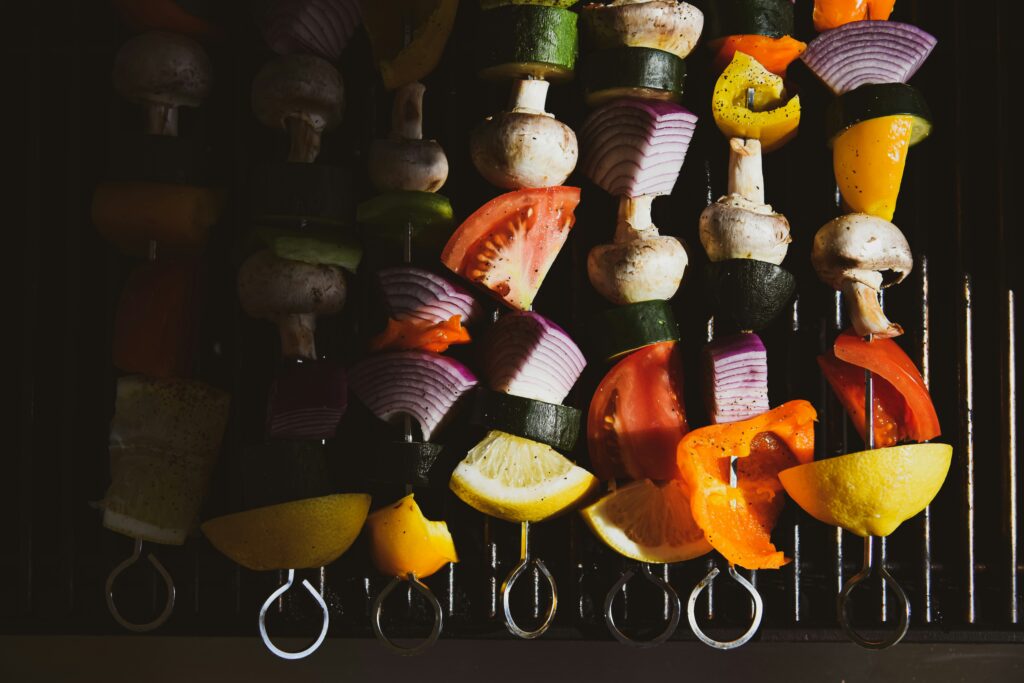
Grill Grates
Grill grates are the surface on which you cook your food and play a crucial role in achieving those beautiful grill marks and delicious flavors. Consider the following factors when choosing grill grates:
Size and Material
Grill grates come in various sizes and materials, such as stainless steel, cast iron, or porcelain-coated steel.
Stainless steel grates are durable, easy to clean, and resistant to rust. They distribute heat evenly and are great for searing meats.
Cast iron grates retain heat well and provide excellent heat retention and distribution. They are ideal for achieving those desirable grill marks and imparting delicious flavors to your food. However, cast iron grates require regular seasoning and maintenance to prevent rusting.
Porcelain-coated steel grates offer a non-stick surface and are easy to clean. They are a popular choice for grilling delicate foods such as vegetables or fish.
Consider the size of your grill and the type of cooking you plan to do when selecting the appropriate grill grate.
Cleaning and Maintenance
Proper cleaning and maintenance of grill grates are essential for keeping them in good condition and ensuring the longevity of your grill. After each use, use a grill brush to remove any residual food particles or grease. For stainless steel or porcelain-coated grates, wash with warm soapy water and rinse thoroughly.
If you have cast iron grates, avoid using soap and water, as this can remove the seasoning. Instead, scrape off any residue and wipe the grates with a damp cloth. To maintain the seasoning, apply a thin layer of oil after each use.
Regularly inspect your grill grates for signs of wear and replace them as needed to ensure optimal grilling performance.
Prepping Grates before Grilling
Before grilling, it is important to properly prep your grill grates to ensure food doesn’t stick and to prevent flare-ups. Start by preheating your grill to allow any residual food or grease to burn off. Once the grates are hot, use a grill brush to scrape off any remaining debris.
To prevent food from sticking, lightly oil the grates before cooking. Use a high smoke point oil such as canola or vegetable oil and a clean cloth or paper towel to apply a thin layer. This will create a natural non-stick surface and keep your food from sticking to the grates.
Charcoal Chimney Starter
A charcoal chimney starter is a handy tool for quickly and safely igniting charcoal for your grill. Consider the following factors when choosing a charcoal chimney starter:
Quick and Safe Charcoal Ignition
Charcoal chimney starters provide a faster and safer alternative to lighter fluid or electric starters. They use the chimney effect to ignite the charcoal quickly and evenly.
To use a charcoal chimney starter, simply fill the top with charcoal, place newspaper in the bottom compartment, and light it. As the paper burns, it ignites the charcoal and creates a steady flow of heat, ensuring even ignition.
Selection and Capacity
When choosing a charcoal chimney starter, consider its capacity and size. Larger charcoal chimney starters can hold more charcoal, allowing you to grill for a longer period without the need for refills. Opt for a size that suits the amount of charcoal you typically use for your grilling needs.
Proper Use and Safety
To ensure safe and effective use of a charcoal chimney starter, follow these guidelines:
Place the chimney starter on a heat-resistant surface, such as a grill grate or concrete.
Avoid using flammable surfaces or placing it on grass or wooden decks.
Use oven mitts or grill gloves when handling the hot chimney starter.
Allow the charcoal to fully ignite and ash over before pouring it into the grill.
By following these safety precautions, you can enjoy the convenience and efficiency of a charcoal chimney starter without compromising safety.
Skewers for Kebabs
Skewers are an essential tool for grilling kebabs or skewered foods. When choosing skewers, consider the following factors:
Metal vs. Wooden Skewers
Metal skewers are durable, reusable, and resistant to heat. They are ideal for grilling larger cuts of meat or heavier ingredients, as they can withstand the weight without bending or breaking.
Wooden skewers, on the other hand, offer convenience and ease of use. They are disposable, making cleanup a breeze. Wooden skewers are great for grilling smaller or more delicate ingredients, such as vegetables or shrimp.
Consider the type of kebabs you plan to grill and your personal preference when choosing between metal and wooden skewers.
Flat vs. Round Skewers
Skewers come in various shapes, with flat and round being the most common options.
Flat skewers offer stability and prevent food from spinning or rotating while grilling. They are great for grilling larger pieces of meat or vegetables. The flat surface also promotes even cooking and allows for better grill marks.
Round skewers, on the other hand, are versatile and can be used for a variety of ingredients. They are easier to thread through smaller or irregularly shaped pieces of food, such as cherry tomatoes or mushrooms.
Consider the ingredients you plan to skewer and the desired grilling outcome when selecting the shape of your skewers.
Size and Number of Skewers Needed
The size of the skewers is an important consideration to ensure proper grilling and presentation. Longer skewers allow for more ingredients to be added, creating larger and more substantial kebabs. Shorter skewers, on the other hand, are ideal for individual portions or when serving smaller bites.
Consider the size of your grill and the amount of food you plan to skewer when determining the number of skewers needed.
Grill Baskets and Pans
Grill baskets and pans are versatile tools that allow you to grill smaller or more delicate foods without the risk of them falling through the grates. Consider the following factors when choosing grill baskets and pans:
Choosing the Right Size
Grill baskets and pans come in various sizes, so it’s important to choose one that fits your grilling needs. Consider the size of your grill and the amount of food you plan to cook. If you frequently grill vegetables or smaller items, opt for a smaller-sized basket or pan. For larger cuts of meat or fish, choose a larger-sized option.
Stainless Steel or Non-Stick
Grill baskets and pans are often made from stainless steel or have a non-stick coating.
Stainless steel options are durable, easy to clean, and resistant to rust. They provide excellent heat conductivity, ensuring even cooking. Stainless steel baskets and pans are great for grilling a variety of foods, including vegetables, seafood, and smaller cuts of meat.
Non-stick grill baskets and pans offer added convenience as they prevent food from sticking and are easier to clean. They are great for delicate or sticky ingredients such as fish or marinated meats.
Consider your cooking preferences and the ease of cleaning when choosing between stainless steel and non-stick grill baskets and pans.
Proper Use for Different Foods
Grill baskets and pans are versatile tools that allow you to grill a wide variety of foods. Use a grill basket for small or delicate ingredients such as vegetables or shrimp. This prevents them from falling through the grates and allows for easier flipping. Grill pans are ideal for cooking fish or larger cuts of meat, as they provide a flat surface and prevent flare-ups.
Follow the manufacturer’s guidelines for proper use and care of grill baskets and pans to ensure optimal grilling results.
In conclusion, having the right tools is crucial for a successful grilling experience. From choosing the right grill to selecting the appropriate accessories, each tool plays a vital role in achieving delicious and perfectly grilled food. Consider your grilling needs, personal preferences, and safety concerns when selecting the tools mentioned in this article. Happy grilling!
